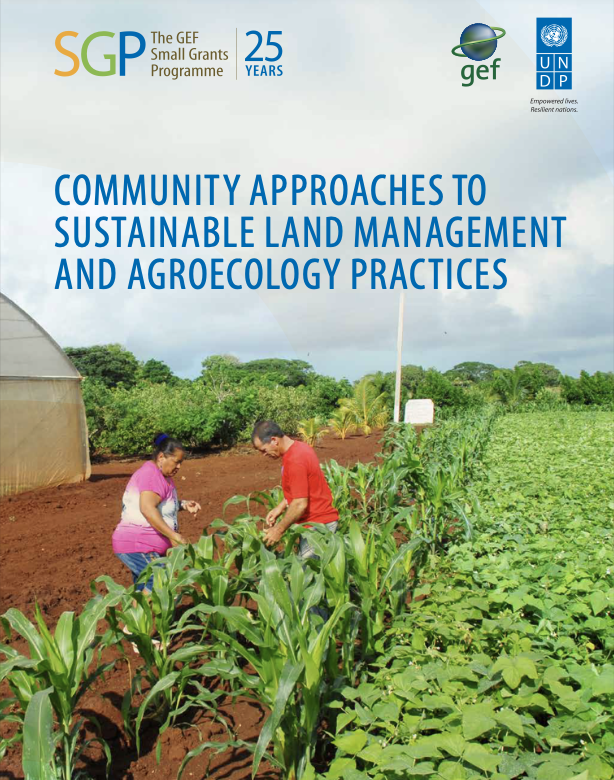Resource information
As of 2017, SGP has awarded over 3,800 small grants to land degradation projects in over 120 countries, many of which are in regions with extreme levels of poverty and food insecurity across Africa and Latin America. Africa, in particular, is experiencing the highest population growth of the developing world, while being exposed and vulnerable to the rising impact from climate change. The collective outcomes of these successful projects show that with careful and targeted intervention communities are being able to address the drivers of land degradation, reverse the negative trends in soil fertility, secure nutritious food from their lands, and sometimes generating a surplus which provides much needed income to meet health and educational requirements of their children. Healthy land is fundamental for human life and wellbeing. It provides food, water, carbon, and other benefits that are essential for our life. However, land degradation is increasingly becoming one of the major global environmental issues today. It is estimated that almost a quarter (22.5 percent) of land has been degraded since the mid-twentieth century. With the global population on the rise, coupled with climate change, the pressure on land and the natural environment are increasing. Local communities are often bearing the brunt of this burden. In particular, poor, women, indigenous peoples, youth, and other vulnerable communities are disproportionately impacted by land degradation. The GEF Small Grants Programme (SGP), implemented by UNDP, has been playing a key role in promoting Sustainable Land Management at the community level. The focus of our program is on: 1) reducing pressures on natural resources from competing land uses in the wider landscapes; and 2) maintaining or improving the flows of agro-ecosystem services to sustain livelihoods of local communities. The program is fully in line with the Global Environment Facility’s strategy on sustainable land management and other related programe. It also clearly supports the implementation of the United Nations Convention to Combat Desertification and its 10 year Strategic Plan on Land Degradation Neutrality. The Sustainable Land Management program is quickly becoming one of the largest portfolio of the SGP. Together with partners, the SGP supports community organizations to use approaches, techniques and methodologies in line with the principles of agroecology and climate-sensitive land resources management. In this publication, you will find good practices and approaches that has been tested and proven successful by SGP projects around the world. These initiatives have shown evidence on improved land management by communities, nested on traditional knowledge and innovation. Sustainable Land Management is quickly becoming one of the largest portfolio of the SGP. Together with partners, the SGP supports community organizations to use approaches, techniques and methodologies in line with the principles of agroecology and climate-sensitive land resources management. In this publication, you will find good practices and approaches that has been tested and proven successful by SGP projects around the world. These initiatives have shown evidence on improved land management by communities, nested on traditional knowledge and innovation. Sustainable Land Management is quickly becoming one of the largest portfolio of the SGP. Together with partners, the SGP supports community organizations to use approaches, techniques and methodologies in line with the principles of agroecology and climate-sensitive land resources management. In this publication, you will find good practices and approaches that has been tested and proven successful by SGP projects around the world. These initiatives have shown evidence on improved land management by communities, nested on traditional knowledge and innovation. The high rate of land degradation is threatening livelihoods and leading to biodiversity and habitat loss. Population pressure and pervasive poverty resulting from political, social and economic stressors is increasing food insecurity in vulnerable communities across the developing world. Against this backdrop, the world will need to increase food production by 60 to 70 percent by 2050. Unless there is a shift in the way land and soils are managed for food production, biodiversity and ecosystem services may be locked into a downward trajectory from which recovery will be impossible or too costly to achieve. The expansion of food production need not come at the expense of native habitat. Rehabilitating and restoring degraded lands offers tremendous opportunities to boost production and enhance food security. Improving land use practices can also go a long way in preserving the health of soils and optimizing the use of water. The GEF Small Grants Programme (SGP), implemented by the United Nations Development Programme (UNDP), has been working with community organizations around the world to identify, implement and scale-up innovative technologies in sustainable land management (SLM). Grassroots agroecological practices that integrate the management of land, water, and biodiversity are starting to meet rising food demands particularly in vulnerable communities of dryland countries. By investing and working with communities on sustainable land management and agroecology, SGP has introduced and disseminated appropriate policies and incentives to accelerate pro-poor growth, thereby contributing to the achievement of the Sustainable Development Goals, including SDG 15 – Life on Land.



